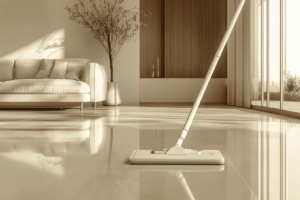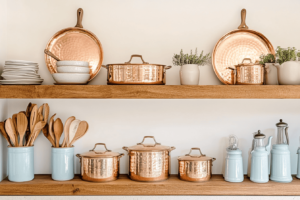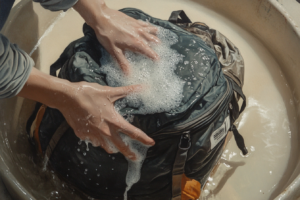In our journey towards creating harmonious living spaces, the challenge of clutter can seem insurmountable, especially for individuals battling hoarding tendencies. The emotional and physical toll it takes can be overwhelming, but the path to reclaiming your space is not a journey you have to undertake alone. Services like Wecasa’s cleaning offer professional and compassionate support to help you embark on this transformative process with confidence.

Understanding Hoarding
Hoarding disorder is a condition that affects many, characterised by difficulty parting with items, regardless of their actual value. This can lead to excessive accumulation, creating living spaces that are cramped and potentially hazardous. Understanding the psychological roots of hoarding is the first step towards compassionate self-help and recovery:
- Psychological reasons: Emotional attachments to objects, fear of loss, and decision-making anxiety are common drivers.
- Empathy and understanding: Recognising that hoarding is a complex issue is crucial in addressing it effectively.
Preparing for the Decluttering Journey
Setting realistic goals and creating a supportive environment are essential preparatory steps:
- Realistic goals: Start small to avoid feeling overwhelmed.
- Supportive environment: Engage friends, family, or professionals like Wecasa cleaning services for support.
- Tools and supplies: Essential items include trash bags, boxes for sorting, and cleaning supplies.
Read more on Must Have Cleanng Supplies
Decluttering Strategies Tailored for Hoarders
Adopting a step-by-step approach can make the decluttering process more manageable:
Start with Less Emotionally Charged Items
- Begin with items that have no sentimental value, such as old magazines, expired products, or duplicate kitchen tools. This helps build momentum and confidence.
- Create a “decision-free zone” for items you’re unsure about, to revisit after making progress elsewhere.
The Three-Box Method
Set up three large containers or areas for each category:
- Keep: Items you use regularly or have strong emotional attachments to.
- Donate: Items in good condition that can benefit others.
- Trash: Items that are broken, expired, or otherwise unusable.
This visual and physical sorting process helps in making decisive actions about possessions.
“One In, One Out” Rule
- Implement a policy where for every new item brought into the home, a similar item must be discarded or donated.
- This rule is particularly effective for items like clothing, books, and kitchenware, ensuring that the total number of possessions remains constant.
Digital Decluttering
- Tackle digital clutter by organising files into clearly named folders and deleting unnecessary documents and photos.
- Unsubscribe from unwanted emails and newsletters to keep your inbox manageable.
- Utilise cloud storage solutions to keep important documents safely stored online, reducing the need for physical storage.
Organising What Remains
Effective organisation is key to maintaining a decluttered space:
Storage Solutions
Use a variety of storage options to best suit different types of items:
- Shelves: Ideal for books, decorative items, and frequently used objects.
- Bins: Use transparent bins for easy identification of contents, perfect for seasonal clothing or holiday decorations.
- Labels: Clearly label bins, shelves, and folders to easily locate items and maintain order.
Organisation System
Develop a system that’s easy to follow and maintain over time. Consider the following approaches:
- By Category: Group items by type (e.g., all clothing together, all books together).
- By Frequency of Use: Place frequently used items in easily accessible locations and seldom-used items in higher or more remote storage areas.
- Zoning: Designate specific areas for specific activities or types of items (e.g., a crafting zone, a bill-paying station).
Maintaining a Decluttered Space
To keep your space decluttered, regular maintenance is essential:
- Routine Checks: Schedule weekly or monthly reviews of different areas to ensure everything remains in its place and to identify any new clutter.
- Adaptation: Be willing to adapt your organisation system as your needs and the number of your possessions change.
Implementing these strategies and organisation tips can transform the overwhelming task of decluttering into a manageable, step-by-step process. This tailored approach not only addresses the physical aspect of decluttering but also respects the emotional journey involved, making it more achievable for individuals with hoarding tendencies.
Dealing with Emotional Challenges
Decluttering can be an emotionally challenging process:
- Coping strategies: Allow yourself to feel emotions but don’t let them halt your progress. Consider mindfulness or therapy to manage attachment issues.
- Professional help: Don’t hesitate to seek professional assistance if the emotional or physical task feels too daunting.
Maintaining a Clutter-Free Space
Preventing a relapse into hoarding requires vigilance and new habits:
- Daily habits: Implement routines that help prevent clutter accumulation.
- Mindful purchasing: Before buying something new, consider its necessity and where it will belong in your home.
- Regular decluttering: Schedule periodic decluttering sessions to keep on top of clutter.
Success Stories and Motivation
Discovering the journeys of those who have successfully navigated hoarding challenges can significantly boost your motivation and provide actionable insights:
- Inspirational Stories: Share narratives that highlight the transformative effects of decluttering, including emotional well-being and improved living conditions. Include before-and-after scenarios to visually depict these changes.
- The Marie Kondo Method: Introduce the KonMari method, which advocates for retaining items that spark joy. This approach has guided many to not only declutter their spaces but also to embrace a lifestyle that prioritizes happiness and order.
- Community and Support: Engage with online forums or local groups dedicated to decluttering. Sharing experiences and tips can foster a sense of belonging and collective progress.
- Celebrating Milestones: Encourage setting personal decluttering goals, no matter how small. Acknowledging these achievements can pave the way for sustained change and a more joyous living environment.
Embarking on a decluttering journey is a brave step towards reclaiming not just your physical space but also a sense of peace and order in your life. Remember, the path to a clutter-free existence doesn’t have to be walked alone.
Professional services like Wecasa cleaning can provide the support and assistance needed to make the process smoother and more manageable. Sharing your journey can inspire others, so feel encouraged to share your tips, successes, and insights with the community. Together, we can transform our spaces into havens of tranquillity and order.













